#eco friendly cleaning products no plastic
Explore tagged Tumblr posts
Text
Soft Landings Home

Website: https://www.softlandingshome.com
Soft Landings Home, with over 35 years of experience, offers eco-friendly, reusable cloth towels made from bamboo. These towels serve as a sustainable alternative to traditional paper towels, suitable for various uses from household cleaning to DIY projects. The company emphasizes environmental responsibility, aiming to reduce paper towel waste and its impact on landfills.
Facebook: https://www.facebook.com/softlandingshome
Instagram: https://www.instagram.com/softlandingshome/
Youtube: https://www.youtube.com/channel/UCUiqSKekXOGkT4OyD39zvrQ
Pinterest: https://www.pinterest.com/softlandingshome/
Keywords:
reusable paper towels
eco friendly cleaning products
best reusable paper towels
reusable paper towel roll
washable paper towels
best eco friendly cleaning products
reusable kitchen towels
green cleaning solutions
eco friendly commercial cleaning products
reusable paper towels washable
environmentally friendly paper towels
reusable kitchen towel roll
environmentally friendly bath towels
environmentally friendly towels
eco friendly cleaning products no plastic
washable paper towel alternative
sustainable cleaning tools
best reusable kitchen towels
eco-friendly cleaning products and green home cleaning
green home cleaning products
eco green cleaning solutions
most environmentally friendly paper towels
affordable eco friendly cleaning products
best eco friendly commercial cleaning products
buy eco friendly cleaning products
cheap eco friendly cleaning products
eco friendly cleaning products for hotels
eco friendly cleaning products near me
eco friendly disinfectant cleaning products
eco friendly floor cleaning products
eco friendly kitchen cleaning products
eco friendly professional cleaning products
eco friendly tablet cleaning products
eco friendly toilet cleaning products
most eco friendly cleaning products
refillable eco friendly cleaning products
green cleaning products home depot
how to make green cleaning products at home
best washable paper towels
best green home cleaning products
green cleaning products home based business
green cleaning products home party
green cleaning products you can make at home
green products for home cleaning
home depot green cleaning products
home green cleaning products
how to make green cleaning products for home
making green cleaning products home
natural green home cleaning products
sell green cleaning products from home
clean environmentally friendly paper towels
disposable wash towels environmentally friendly
environmentally friendly hand towels
environmentally friendly kitchen towel
environmentally friendly made towels
environmentally safe paper towel
biodegradable kitchen products
biodegradable kitchen cleaning products
bamboo cloth towels
bamboo face towel cloth
#reusable paper towels#eco friendly cleaning products#best reusable paper towels#reusable paper towel roll#washable paper towels#best eco friendly cleaning products#reusable kitchen towels#green cleaning solutions#eco friendly commercial cleaning products#reusable paper towels washable#environmentally friendly paper towels#reusable kitchen towel roll#environmentally friendly bath towels#environmentally friendly towels#eco friendly cleaning products no plastic#washable paper towel alternative#sustainable cleaning tools#best reusable kitchen towels#eco-friendly cleaning products and green home cleaning#green home cleaning products#eco green cleaning solutions#most environmentally friendly paper towels#affordable eco friendly cleaning products#best eco friendly commercial cleaning products#buy eco friendly cleaning products#cheap eco friendly cleaning products#eco friendly cleaning products for hotels#eco friendly cleaning products near me#eco friendly disinfectant cleaning products#eco friendly floor cleaning products
1 note
·
View note
Text
I've been using a reusable menstrual cup for a while now, but I can't use it at night so I've still had to buy pads (still way less than I was before the cup though). I think I'll save up for these reusable pads and use them with the cup instead.
i learned that in August 2014 Women’s Voices for the Earth commissioned testing of four types of Always menstrual pads, manufactured by Procter & Gamble. The certified laboratory STAT Analysis Corporation analyzed the products for volatile organic compound.

“The results of the testing indicate that both scented and unscented Always pads emit toxic chemicals, including chemicals identified by the U.S. Department of Health and Human Services National Toxicology Program, the Agency for Toxic Substances and Disease Registry, and the State of California Environmental Protection Agency as carcinogens, and reproductive and developmental toxins. None of these chemicals are disclosed on the product by the manufacturer.” (x)
#invest in good quality products#Which last forever#Saves way more money in the long run#Which is important#Also eco friendly!#And better for your body!#Menstrual cups are amazing btw#They're better than tampons#And don't go up nearly as high#And are made of safe plastics#And last forever#And are easy to clean
119K notes
·
View notes
Text
What is Eco-Friendly?
Outline Heading Subheadings Introduction What is Eco-Friendly? Understanding Eco-Friendly The Definition of Eco-Friendly The Importance of Eco-Friendly Practices Eco-Friendly vs. Sustainability Eco-Friendly Practices Reducing Waste Recycling and Reusing Sustainable Transportation Energy Conservation Water Conservation Eco-Friendly Products Identifying Eco-Friendly Products Benefits of…
#Benefits of Eco-Friendly Technology#Benefits of Using Eco-Friendly Products#Call to Action for a Greener Future#Case Studies of Successful Eco-Friendly Businesses#Common Challenges in Adopting Eco-Friendly Practices#eco friendly#eco friendly ac#eco friendly activities#eco friendly agriculture#eco friendly air conditioner#eco friendly alternatives to plastic#eco friendly bag#eco friendly birthday decorations#eco friendly bottles#eco friendly bricks#eco friendly building#eco friendly building materials#eco friendly business ideas#eco friendly car#eco friendly carry bags#eco friendly cleaning products#eco friendly clothes#eco friendly crackers#eco friendly debit card#eco friendly decoration#eco friendly decoration ideas#eco friendly diapers#eco friendly disposable plates#eco friendly drawing#eco friendly dress
1 note
·
View note
Text
A list of (realistic) things you can do to be more environmentally friendly
(from an earth-loving horticulture student.)
— COSMETICS
Use bar soap instead of soap bottles
Use old toothbrushes for cleaning surfaces
Try exploring and researching some homemade face/body/lip products
Use ice sleeves, sunglasses, and caps instead of sunscreen (Edit: I’ve seen people say that it is safer and even necessary to wear sunscreen at all times so try to use eco friendly sunscreen instead! In my country it’s pretty uncommon to wear sunscreen often as we usually wear ice sleeves which is why I did not know this oof)
Use coffee grinds or homemade tumeric masks instead of cosmetic products with exfoliator beads
Invest in a metal ear cleanser instead of cotton buds
Try placing more importance on skincare instead of contributing to exploitative beauty companies by buying makeup
Use cosmetic products that do not contain palm oil
— CLOTHING
Try as much as possible to rewear your outfits at least twice before washing them
Actually WEAR your clothes! I know some of y’all just wear them once for your Instagram post and let it rot in your closet forever. Stop doing that!
Thrift, stitch up holes in your clothes, and use second hand clothing instead of supporting fast fashion companies like SHEIN, H&M, Zara, etc.
Cut up your old clothing into yarn and do macramè with it
Cut patches of old clothing to turn into reusable cotton pads
Learn how to knit, crochet or stitch your clothes!
If you use tampons, try menstrual cups or discs instead. If you use pads, try reusable pads or period underwear. (Trust me, it works). Also, use reusable panty liners instead of disposable ones. They may seem expensive but you will end up saving a lot more in the long run
— GARDENING
Plant seeds/cuttings in your old bottles, jars, and containers
Propagate your plants and exchange cuttings with your friends instead of buying new plants
Make your own soil mixes instead of buying soil mixes
Better yet, don’t use soil for your indoor plants and try getting into hydroponics or semihydroponics instead. This saves so much water and doesn’t contribute to mining of soil
Fertilise plants with fruit peels, coffee grinds, and tea leaves. (DO NOT use chemical fertiliser on soil)
Plant more legume plants in your garden instead of using nitrogen fertilisers. (Look up the nitrogen cycle if you need an explanation on this)
Avoid pesticides unless really needed. Try sprinkling cinnamon powder on soil or spraying neem oil on plants and soil to keep away pests.
If you have a lawn, try looking into rain gardens and consider making one
Let the (non invasive) weeds in your lawn/garden grow! They are there for a reason!
Stop killing earthworms and millipedes in your garden. This also applies to snails native to your region. They are there for a reason.
Water used to wash fruits and rice can be used to water plants
— REDUCE, REUSE
Use the caps of jars as soap holders
Use recycled paper/notebooks
Wash and dry your glass/plastic items before throwing them in the recycling bin
Keep any plastic bags for future use
Use eco friendly or reusable dish sponges
Use reusable straws and cups
Invest in a fabric cup holder
Bring a water bottle with you wherever you go
Drink more water and less sugary drinks
Bring reusable bags for buying groceries instead of using plastic ones
Always keep a folded up tote/shopping bag with you in case you spontaneously decide to buy something
— ELECTRICITY
Set a timer on your air conditioning instead of letting it run throughout the night
Better yet, use a fan instead of an air conditioner
Open your windows! Aerate your home!
Allow natural light to enter your home during the daytime, so as to avoid turning on your lights
Switch to LED lightbulbs instead of regular lightbulbs
Turn off any switches in your house when they are not in use
Collect the water from your air conditioner/dehumidifier condenser and use that to water plants, clean surfaces, steam ironing, and flushing toilets. Do not drink it though!
— INTERNET
Delete your all of your unwanted emails
Delete your inactive social media accounts
Try not to post excessively on social media and stop scrolling excessively too. This not only reduces energy usage but also improves your mental health and productivity
Try to keep to one social media app instead of having so many
Reduce your internet usage
Save your eBooks on a thumbdrive instead of on cloud
Use Ecosia instead of Google
Stop being influenced by social media trends that only just contribute to consumerism
Download music instead of streaming
Reduce online shopping
— FOOD
Reduce intake of processed foods
Reduce intake of fish, beef, and dairy
Try eating vegan or vegetarian foods at least once or twice a week
Cook your own meals instead of eating out
Bring your own food containers when taking away food from stores
Beeswax wrap instead of cling wrap!
Buy loose-leaf tea or plastic free tea bags instead of regular tea bags
Eat more mushrooms, vegetables, and fruits and drink more water
Support local farmers
And finally, educate yourself more about ecology and the environment!
#environment#ecology#sustainability#ecofriendly#anti lawn#anti beauty culture#hell on earth#save the earth#recycling#fast fashion#plants#feminism#environmental activism#plantcore#ecopunk#solarpunk#horticulture#sustainable#slow fashion#zero waste#plastic free#conservation#climate change#global warming#soil science
2K notes
·
View notes
Text
Women have long surpassed men in the arena of environmental action; across age groups and countries, females tend to live a more eco-friendly lifestyle. Compared to men, women litter less, recycle more, and leave a smaller carbon footprint. Some researchers have suggested that personality differences, such as women’s prioritization of altruism, may help to explain this gender gap in green behavior.
Our own research suggests an additional possibility: men may shun eco-friendly behavior because of what it conveys about their masculinity. It’s not that men don’t care about the environment. But they also tend to want to feel macho, and they worry that eco-friendly behaviors might brand them as feminine.
The research, conducted with three other colleagues, consisted of seven experiments involving more than 2,000 American and Chinese participants. We showed that there is a psychological link between eco-friendliness and perceptions of femininity. Due to this “green-feminine stereotype,” both men and women judged eco-friendly products, behaviors, and consumers as more feminine than their non-green counterparts. In one experiment, participants of both sexes described an individual who brought a reusable canvas bag to the grocery store as more feminine than someone who used a plastic bag—regardless of whether the shopper was a male or female. In another experiment, participants perceived themselves to be more feminine after recalling a time when they did something good versus bad for the environment.
Men may eschew green products and behaviors to avoid feeling feminine. In one study, we threatened the masculinity of male participants by showing them a pink gift card with a floral design and asking them to imagine using the card to purchase three products (lamp, backpack, and batteries). Compared to men shown a standard gift card, threatened men were more likely to choose the non-green rather than green version of each item. The idea that emasculated men try to reassert their masculinity through non-environmentally-friendly choices suggests that in addition to littering, wasting water, or using too much electricity, one could harm the environment merely by making men feel feminine.
Ironically, although men are often considered to be less sensitive than women, they seem to be particularly sensitive when it comes to perceptions of their gender identity. In fact, a previous study suggests that men find it to be more difficult than women to choose between masculine and feminine versions of everyday food and household items and will usually change their preferences to be more manly when allowed time to think about their decisions. Something as simple as holding a purse, ordering a colorful drink, or talking in a high voice can lead to social harm, so men tend to keep a sharp eye out for any of these potential snares.
So what can pro-environmental marketers do to buffer against the threat posed to men by the green-feminine stereotype? First, eco-friendly marketing messages and materials can be designed to affirm men’s masculinity and give them the confidence to overcome their fear of being judged as feminine when engaging in green behaviors. For example, in one experiment, men who received feedback affirming their masculinity were more interested in purchasing an eco-friendly version of a cleaning product. Men who feel secure in their manhood are more comfortable going green.
Second, green products and organizations can be marketed as more “Men”-vironmentally-friendly, with more masculine fonts, colors, words, and images used in the branding. To illustrate, men in one experiment were more likely to donate to a green non-profit with a masculine logo (black and dark blue colors featuring a howling wolf, with the name “Wilderness Rangers” in a bold font) than one with a traditional logo (green and light tan colors featuring a tree, with the name “Friends of Nature” in a frilly font). And in a field study conducted at a BMW dealership in China, male customers were more interested in a hybrid vehicle after viewing a print ad featuring a masculine term in the model’s description than when viewing the traditional print ad.
Together, these findings highlight how the green-feminine stereotype inhibits men from taking eco-friendly actions, and suggest that masculine affirmation and masculine branding may be effective in narrowing the gender gap in environmentalism. Make the man feel manly, and he’s more likely to go green.
–
MEN ARE IDIOTS. MEN ARE IDIOTS. MEN ARE IDIOTS.
THE COLOR GREEN IS NOW "TOO FEMININE" FOR MEN APPARENTLY.
FUCK THIS. FUCK YOUR 33 SPORTS CARS. FUCK YOU.
ANDREW TATE SMALL DICK ENERGY @ GET A LIFE DOT COM
WE DON'T NEED TO AFFIRM THE MASCULINITY OF THESE DEFICIENT HYPERSENSITIVE INSECURE BETA MOIDS. WE NEED TO PUBLICLY SHAME THEM. THAT'S THE LANGUAGE THEY SPEAK. THAT'S THE LANGUAGE THEY'LL RESPOND TO.
835 notes
·
View notes
Text
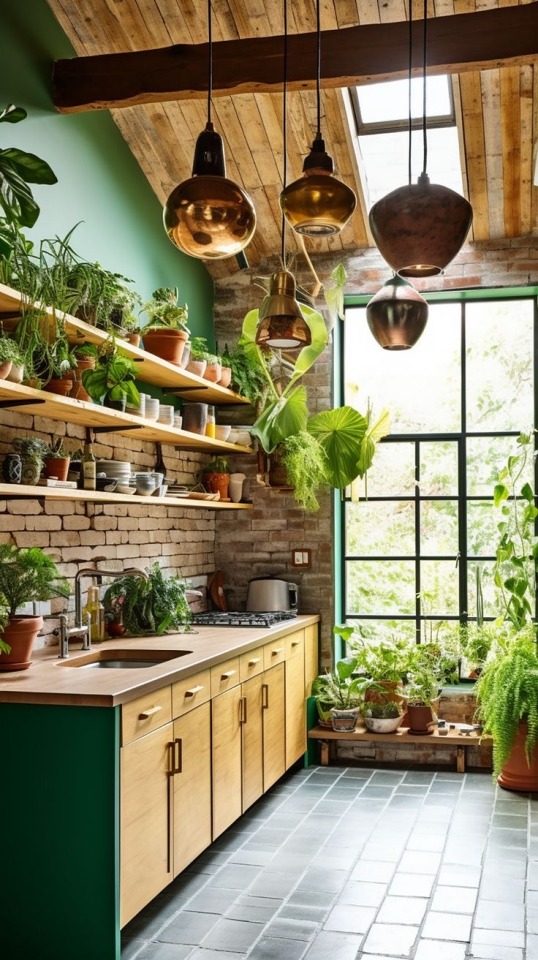



Ways to practice eco-friendly living in your home
1. Reduce energy consumption:
- Install energy-efficient appliances and LED light bulbs.
- Turn off lights and unplug electronics when not in use.
- Use natural light as much as possible.
- Set your thermostat to a lower temperature in winter and higher in summer.
- Insulate your home properly to reduce heating and cooling needs.
2. Save water:
- Fix any leaks in faucets and toilets promptly.
- Install low-flow showerheads and faucets.
- Collect rainwater for watering plants.
- Only run the dishwasher and washing machine with full loads.
- Use a broom instead of a hose to clean outdoor spaces.
3. Practice waste reduction:
- Recycle paper, plastic, glass, and metal.
- Compost kitchen scraps and yard waste.
- Opt for reusable products instead of disposable ones (e.g., cloth napkins, rechargeable batteries).
- Avoid single-use plastics, such as plastic bags and water bottles.
- Use a reusable shopping bag.
4. Use eco-friendly cleaning products:
- Choose natural, non-toxic cleaning products or make your own using ingredients like vinegar, baking soda, and lemon juice.
- Avoid products containing harmful chemicals that can harm the environment and your health.
5. Grow your own food:
- Plant a garden to grow vegetables, fruits, and herbs.
- Use organic and natural fertilizers instead of synthetic ones.
- Compost food scraps to enrich the soil.
6. Opt for sustainable materials:
- Choose furniture made from sustainable materials like bamboo or reclaimed wood.
- Use eco-friendly flooring options like bamboo, cork, or reclaimed hardwood.
- Select paint and other finishes that have low or no volatile organic compounds (VOCs).
7. Reduce plastic waste in the kitchen:
- Use glass or stainless-steel containers for food storage instead of plastic.
- Replace plastic wrap with beeswax wraps or reusable silicone covers.
- Use refillable water bottles and avoid buying bottled water.
8. Conserve energy in the kitchen:
- Use energy-efficient appliances.
- Cook with lids on pots and pans to retain heat and reduce cooking time.
- Opt for smaller appliances like toaster ovens instead of full-sized ovens when possible.
9. Encourage sustainable transportation:
- Use public transportation, walk, or bike whenever possible.
- Carpool or arrange a car-sharing service with neighbors or colleagues.
- Transition to an electric or hybrid vehicle if feasible.
10. Educate and involve your family:
- Teach your family about the importance of eco-friendly practices and involve them in the decision-making process.
- Encourage everyone to adopt sustainable habits and lead by example.
- Discuss environmental issues and brainstorm new ideas for greener living.
#home improvement#work from home#make money from home#homebrew#ecology#ecofriendly#sustainability#home design#home#acne treatment#homedesign#homemade#home decor#home business#home & lifestyle#homestuck#welcome home#homens de sunga#homeinterior#homestyle#cozyplaces#cozy glow#cozyhome#cozy cozy#cozy living#cozyvibes#cozy autumn#cozy fall#cozy mystery#cozycore
88 notes
·
View notes
Photo
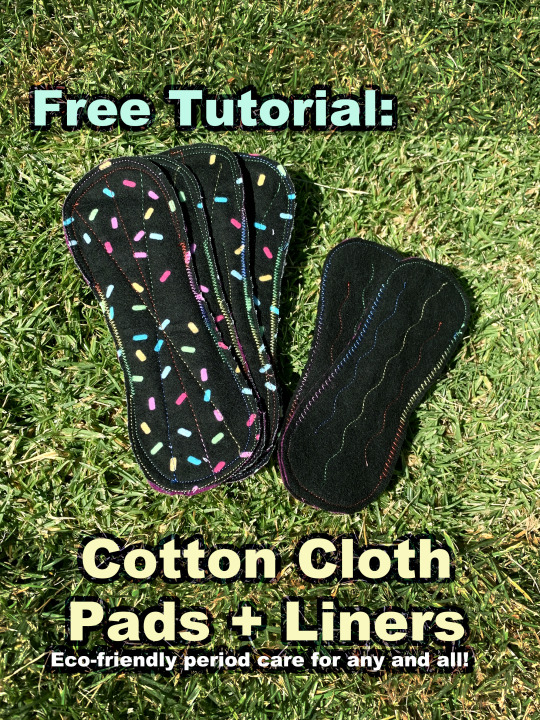
If you menstruate and are on a path of zero-waste, avoiding plastics, avoiding toxic chemicals, minimizing your footprint, or all of the above, then you’ve likely been faced with a frustrating conundrum: Menstruating is a natural part of your life, but there doesn’t seem to be too many ‘clean’, safe options to deal with it.
First off, let me say that I have been off and away from mainstream menstrual care for over 14 years, including birth control (wrecked my hormones), and storebought sanitary products (full of harmful chemicals like bleach, perfume and hormone-disrupting PFAs!). I have used silicone cups, discs, and cloth pads, and have a lengthy and thorough review of how they are used and what brands I prefer up on my Patreon.
However, for today I want to focus on one tried and true item: The pad.
Pads have been around for centuries- longer if you include their earlier predecessor, The Rag. However, in this time we’ve come pretty far to create a more secure, clean and manageable item— though the creation of the chemically-treated, plastic lined disposable pad has been a regrettable pit stop.
Cloth pads are great because they come in a wide range of colors and patterns (making them more appropriate for more kinds of menstruating people, including men and children) and can be reused for years if cared for properly. Over the past decade, they’ve gone from being available solely from independent sellers on sites like Etsy to being sold alongside menstrual cups in the ‘alternative’ period care section of many stores. You can also specifically buy pads made from organic or natural materials and avoid petrol-based textiles.
However, a downside here is that purchasing pads can still be expensive even if you aren’t buying direct from an indie seller. Now, it’s not that they aren’t worth every penny; having made 3 sets myself I fully understand the time, skill and materials that go into making them. But the fact of the matter is that under late-stage capitalism, paying the higher up-front cost for a set of reusable pads can be daunting, even if you know it’s cheaper in the long run (and it is). If you have access to fabric, a sewing machine, and sewing skills, you can half the price, and I’m going to show you how. The cost of fabric can even be lowered by recycling old towels and clothing and I’ll talk about what you need in the tutorial! As a set of good cloth pads can last from 4-6 years or more, this is a great, frugal and eco-friendly option!
Additionally, I’m going to tell you how to wash and care for your pads since working with reusable pads is way different than just wrapping them up and throwing them in the trash.
For the step by step directions, photos and care tutorial, click here to read for free on my Patreon. All of my content is Patron-supported and Patrons also receive private and early-release posts! If you appreciate my work, feel free to visit my membership page and choose the tier that works for you.
Free tutorial here.
Tips + Thank yous Insta
457 notes
·
View notes
Text

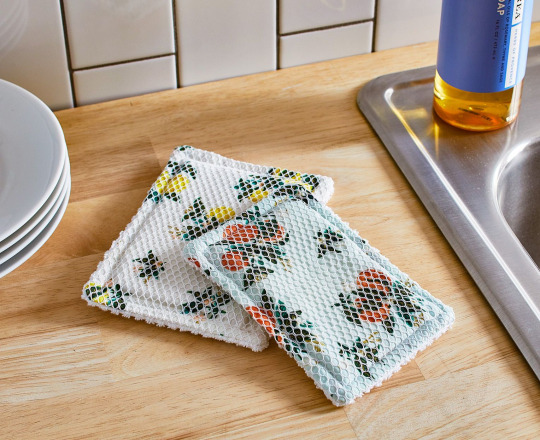
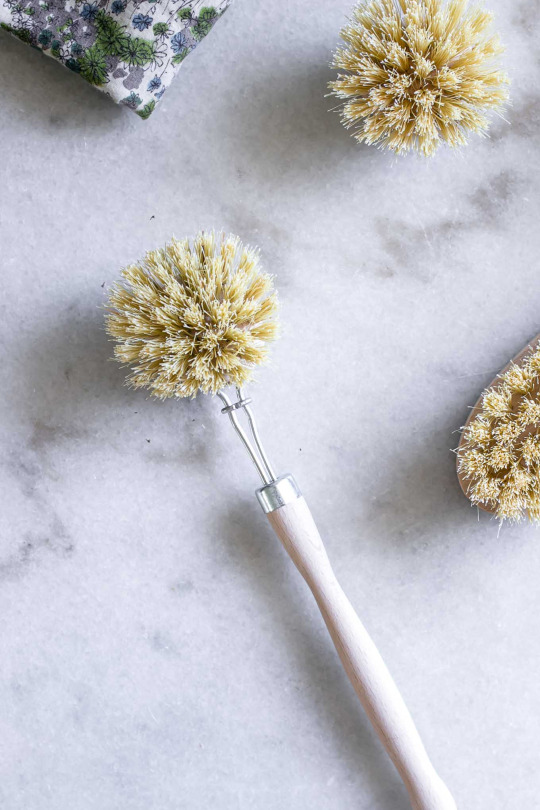



6 Eco-Friendly Alternatives to Kitchen Sponges
Natural Cellulose Sponges, Reusable Cloth Sponges, Wooden Dish Sponges, Reusable Dish Rags, Copper Scours, Scours made from Natural Materials (eg. coconut coir)
Traditional kitchen sponges are made of a mixture of cellulose, a naturally-occurring wood fiber, and synthetic materials like polyethelene plastic mesh to provide durability and a scouring surface. This combination is what makes up the typically yellow and green colored sponges that are most commonly sold today. In addition to its mixture of natural of synthetic materials, kitchen sponges are also usually treated with antibacterial agents to prevent the growth of harmful bacteria (and then spreading it around your kitchen each time you clean). Add to this that most kitchen sponges have a lifespan of tops a few weeks – and they’re packaged in plastic – and you can see how these are not a low waste option for keeping your kitchen clean. In addition, antibacterial agents added to sponges typically include triclosan, and according to the Environmental Working Group, “the U.S. FDA advisory committee has found that household use of antibacterial products provides no benefits over plain soap and water, and the American Medical Association recommends that triclosan not be used in the home, as it may encourage bacterial resistance to antibiotics.”
#p#txt#mindful consumption#zero waste#low waste#eco friendly#eco conscious#ecofeminism#sacred spaces#solarpunk#mindful living#soft living#slow living#ethical consumption#green living#sponges#sidewalkchemistry
113 notes
·
View notes
Text
some of my ‘ins’ of 2024
-wood wick or beeswax candles
-eco friendly cleaning products
-pleasure
-naturally non-caffeinated teas
-meditation & prayer
-used bookstores
-gratitude
-spending time in nature
-plastic free
-putting energy only into places and people that give good energy back
#most of these have been in for me for years but we vibe lol#oatmilck#ins and outs#aesthetic#self care#mindfulness#clean aesthetic#it girl#spiritual#angel numbers#prayer#good vibes#slow living#eco friendly#low waste
34 notes
·
View notes
Text
Be eco-friendly without realizing it
I'm from Mexico, (I say this just to clarify, in case something sounds strange). I live in a still rural area (although urbanization is catching up with us) and I did my first years of school in schools that were a maximum of ten minutes away on foot. At twelve I started taking public transport and when I turned fifteen my trip Every day it was an hour on public transportation (which is considered normal in the area where I live). The thing is that we were always very conscious of our waste.
Much of what we did since my childhood is wash clothes and clean our house with filtered rainwater in the rainy season. The clothes have always been hung in the patio and dried by the air or the sun (we have never had a dryer). Refuse yogurt, cream and other plastic containers. The jars are reused to store cinnamon, coffee, sugar, powdered milk, spices and other things. When we wash the dishes, in a plastic bowl we add water and a few drops of biodegradable soap and with that we wash all the glasses, plates, utensils and pots that we use for cooking and eating. We currently have chickens that roam freely and thanks to this we have a daily supply of eggs. We are not vegan, but I'm not really that worried about that, because my area is highly rural it is very easy to get meat from local producers, the only thing we can't get so easily is fish but it's not like we eat it commonly. If we have too many plastics, glass, cans and metals that we do not use at home, there are these people who buy these types of products by the kilo to in turn resell them to recycling plants that are far from us. The plastic bags we have are generally used for garbage that is not biodegradable. This year we plan for a part of our patio to become a more abundant garden, last year we did it and it was good, we hope to have more success this year. It was great to see butterflies, bees and hummingbirds out the window while I was washing the dishes. I recently bought an electric oven and started learning how to bake.
When I got into the solarpunk label I saw so many practices that we have done in my house throughout my life, it was so cool.
The hope of a future in which we can all live in the most respectable way possible with our planet.
21 notes
·
View notes
Text
How to Properly Manage Waste: 10 Effective Ways to Protect Our Environment
Waste management is a critical issue facing our planet today. Improper disposal of waste not only leads to pollution but also wastes valuable resources. The good news is that each of us can make a big difference by adopting simple yet effective waste management practices in our daily lives. Here are 10 ways to properly manage waste and reduce your environmental impact:
1.Reduce Waste at the Source: Reducing waste begins with mindful purchasing and consumption. Choose products with minimal packaging or buy in bulk to decrease plastic waste. Avoid single-use items like straws, plastic cutlery, and bottled drinks whenever possible.
2. Practice Recycling: Separate recyclables like paper, glass, and plastic, follow local recycling guidelines, and clean items necessary to avoid contamination.
3. Composting Organic Waste; Compost organic waste like food scraps and yard trimmings to create nutrient-rich soil and reduce methane emissions. Use a small compost bin or Join community composting programs if you don't have a garden.
4. Avoid Disposable Products: Reduce waste by using reusable items like cloth napkins, towels, and travel mugs instead of disposables like paper towels and plastic cups.
5. Donate Unwanted Items: Donate unwanted clothes, electronics, or furniture to reduce waste and help others. Many organizations offer pick-up services for larger items.
6. Repurpose and Upcycle: Turn old items like jars or clothes into new, useful things to reduce waste and spark creativity.
7. Buy Sustainable Products: Choose eco-friendly products made from recycled materials and support ethical brands.
8. Educate on Waste Management: Share tips and facts about proper waste disposal to raise awareness and promote collective action.
9. Reduce E-Waste: Recycle or donate old electronics to prevent toxic waste and reduce environmental harm.
10. Buy Less, Choose Wisely: Avoid impulse purchases by opting for durable, high-quality items that reduce waste.
2 notes
·
View notes
Text
If you say things like "If you do (x harmless thing) you're immoral" you deserve to be blocked.
Just a moment ago I was told I was immoral for something completely random and also really harmless. They tried to spin it on me for not being "eco friendly". My brother in faith and the universe - I am disabled. That means unable to do things most people can. Certain not "eco friendly" things help me live, help me clean up, help me eat, help me do regular people things without being subjected to pain, embarassment or lack of hygene. Products such as straws, baby wipes, plastic containers, those individually wrapped one medicine pill things which annoy me a lot (why does it have to be one pill per box? who knows), plastic cups and bottles as well as one time use IV bottles, lines and needles. Empty containers of pills which are also plastic.
I can't not take my medicine because I depend on it and need it every day. I can't not go for an IV when I need it. I can't not use baby wipes when I want to be clean and only have access to that specific thing. I can't use paper plates or straws because they're a sensory nightmare.
I am very much aware of how many resources it takes to keep me alive. I already feel like a whole fucking burden on everyone - now y'all wanna poke at me for singlehandedly killing the planet?
Where's that energy when your favorite influencer buys their 6th mansion and their 8th sports car they don't need? Nonexistant? Well, that's your problem.
-Amber (she/they/it/star/shine/rot)
(my blog contains nsfw, minors dni.)
2 notes
·
View notes
Text

Useful Ecology
We’re hearing about a whole range of ecological measures.
We need to buy eco-friendly cleaning products, insulate our homes, change our boilers and have a Canadian well, buy less plastic, sort our waste, drive eco-friendly cars, limit our speed on the roads, limit our water consumption when we shower or flush the toilet, limit your consumption of concrete, have a compost in our garden, limit our consumption of meat, use Aleppo soap and limit our consumption of sun creams, use a solar oven, invest in ecological energy (wind turbines, photovoltaic panels, hydroelectric plants), buy second-hand. Electricity, oil and food prices are rising under the pretext of ecology.
Mining, lithium extraction, nuclear power plant waste, large factories, construction, petroleum, intensive agriculture (soil pollution, exorbitant water consumption). Multinationals pollute far more than private individuals, and are not subject to any ecological measures to limit their pollution. The world’s richest people, especially via multinationals, are responsible for the world’s biggest ecocides: they destroy forests such as the Amazon rainforest, pollute rivers, destroy the seabed, impose conditions on farmers such that they destroy the land, which is in danger of becoming sterile due to the use of chemicals, and mistreat animals. What’s more, chemicals such as pesticides are causing the extinction of entire animal species. They should be judged internationally, not according to the laws they decide at national level in each country.
Some sectors, such as agriculture and construction, are even subsidized. Others even receive the Legion of Honor (e.g. Total).
Revealed: the 20 firms behind a third of all carbon emissions – The Guardian: https://www.theguardian.com/environment/2019/oct/09/revealed-20-firms-third-carbon-emissions
90% of industrial pollution comes from manufacturing things: housing, vehicles and clothing. Obsolescence, changing standards that force people to equip themselves, and the use of consumption as a status object are all very harmful.
How Buying Stuff Drives Climate Change – Columbia University – Columbia Climate School: https://news.climate.columbia.edu/2020/12/16/buying-stuff-drives-climate-change/
The measures mentioned at the beginning are useful for preserving the environment and limiting consumption, but they are minor measures compared to those that should be taken on a global scale.
How companies blame you for climate change – BBC: https://www.bbc.com/future/article/20220504-why-the-wrong-people-are-blamed-for-climate-change
But most of the pollution is still to come. Developing countries want factories, energy, cars and meat. If we don’t help them, this will happen with highly polluting coal-fired plants, petroleum and intensive agriculture (sometimes carried out in deserts, which sucks up all the water the population needs). We need to look at ecology on a global scale, and not just take measures in developed countries, otherwise the ozone layer will suffer and the air will become unbreathable.
“If left unchecked, climate change will cause average global temperatures to increase beyond 3°C, and will adversely affect every ecosystem. Already, we are seeing how climate change can exacerbate storms and disasters, and threats such as food and water scarcity, which can lead to conflict. Doing nothing will end up costing us a lot more than if we take action now.” Goal 13: Take urgent action to combat climate change and its impacts – ONU: https://www.un.org/sustainabledevelopment/climate-change/
We must help developing countries to develop in a way that is healthy for humanity.
This is difficult. It’s not a question of sending money, because experience shows that the money would be diverted to corrupted individuals. It means that having people on the ground to check that the ecological work is being done is necessary. People need to be educated about ecology and given the means to put ecological measures in place. For developing countries to become low-emission countries like those in Europe, $2,400 billion a year would be needed. At present, fossil fuel subsidies total $5,000 billion a year. Switching to renewable energies would cost half as much as maintaining fossil fuels. António Guterres, attacked the use of subsidies in May 2024, declaring, “What we are doing is using taxpayers’ money – which means our money – to boost hurricanes, to spread droughts, to melt glaciers, to bleach corals. In one word – to destroy the world”. Taxes subsidize the destruction of the planet instead of saving it. This is one of the topics to be discussed at COP 29 from November 11 to 22, 2024.
Money, money, money: Financing plans for the climate transition – i4ce: https://www.i4ce.org/en/publication/financing-transition-multi-scale-challenge-climate/
After Bonn and towards COP 29: the battle on finance and the role of financing plans for the transition – i4ce: https://www.i4ce.org/en/after-bonn-towards-cop29-battle-finance-role-financing-plans-transition-climate/
How do we rein in the fossil fuel industry? Here are eight ideas – The Guardian: https://www.theguardian.com/environment/2019/oct/14/how-rein-in-fossil-fuel-industry-eight-ideas
Global Fossil Fuel Subsidies Remain Large: An Update Based on Country-Level Estimates – IMF: https://www.imf.org/en/Publications/WP/Issues/2019/05/02/Global-Fossil-Fuel-Subsidies-Remain-Large-An-Update-Based-on-Country-Level-Estimates-46509
China and Russia invest in developing countries without any ecological conscience. We need to be diplomatic with these countries to get them to take ecology into account.
---------------------------------------------------------------
Ecologie efficace: https://www.aurianneor.org/ecologie-efficace/
Eficiencia ecológica: https://www.aurianneor.org/eficiencia-ecologica/
Fund: https://www.aurianneor.org/fund-according-to-the-latest-international/
Juste une question de culture; et de politique…: https://www.aurianneor.org/juste-une-question-de-culture-et-de-politique/
Ecoterrorism: https://www.aurianneor.org/ecoterrorism/
The richest 1% are at war with the rest of the world: https://www.aurianneor.org/the-richest-1-are-at-war-with-the-rest-of-the-world/
My hormones want admiration: https://www.aurianneor.org/my-hormones-want-admiration-i-want-to-shine-im/
Protecting water: https://www.aurianneor.org/protecting-water/
Peru, biodiversity in danger: https://www.aurianneor.org/peru-biodiversity-in-danger/
Consumption: Dream & Reality: https://www.aurianneor.org/consumption-dream-realitymore-love/
Bright idea of the century: https://www.aurianneor.org/bright-idea-of-the-century-the-light-bulb/
Stop the all-concrete approach: https://www.aurianneor.org/stop-the-all-concrete-approach/
Tomorrow – Chap 2: L’énergie: https://www.aurianneor.org/tomorrow-chap-2-lenergie-demainlefilm/
40 ans, un risque maîtrisé?: https://www.aurianneor.org/40-ans-un-risque-maitrise-votez-pour-defendre/
Tomorrow – Chap 1: Agriculture: https://www.aurianneor.org/tomorrow-chap-1-agriculture/
Nano Confiance: https://www.aurianneor.org/nano-confiance-affaire-des-oeufs-contamines-les/
Meat and environment, is that possible?: https://www.aurianneor.org/meat-and-environment-is-that-possible-no-if/
Solar Oven: https://www.aurianneor.org/solar-oven/
Clean Clothes: https://www.aurianneor.org/clean-clothes-shirt-on-your-back/
The eco comfort, a way of life: https://www.aurianneor.org/the-eco-comfort-a-way-of-life-how-to-use/
Hydrogen-powered aircraft: https://www.aurianneor.org/hydrogen-powered-aircraft/
Healthy Road: https://www.aurianneor.org/healthy-road-be-healthier-with-fewer-traffic/
Piste scooter / Moto: https://www.aurianneor.org/piste-scooter-moto-healthy/
Le Paon Scooter: https://www.aurianneor.org/le-paon-scooter-good-for-your-budget-compared/
The artistic blur of ecological cars: https://www.aurianneor.org/the-artistic-blur-of-ecological-cars-i-what-this/
Zero emission transport: https://www.aurianneor.org/zero-emission-transport/
Free public transport: https://www.aurianneor.org/free-public-transport/
Healthy Hair, The advice of a Wookie for hair: https://www.aurianneor.org/healthy-hair-the-advice-of-a-wookie-for-hair-and/
Healthy Skin: https://www.aurianneor.org/healthy-skin-wikipedia-aleppo/
Le savon: https://www.aurianneor.org/le-savon-le-meilleur-desinfectant-le-meilleur/
Healthy Tan: https://www.aurianneor.org/environment-health-perspective-sunscreens-damage/
Sun Cream: https://www.aurianneor.org/sun-cream-differences-entre-ecran-solaire-mineral/
#air#aurianneor#cars#china#climate change#co2#coal#cost#destroy the world#developed countries#developing countries#development#development aid#diplomacy#eco-fascists#ecology#ecosystems#ecoterrorism#factories#fossil fuels#healthy#humanity#invest#meat#money#multinationals#no nonsense#ozone#pollution#rich
2 notes
·
View notes
Text
Welcome to Clean Earth Fun Facts: Where Gaming Meets Green Living!
🌍 Welcome to Clean Earth Fun Facts, your ultimate destination for the most entertaining and enlightening facts about our planet and how to keep it clean and green! 🌱 Our mission is to spread awareness about environmental issues and inspire action towards a sustainable future. Join us in this journey to learn, laugh, and make a difference! 🌍
Why Gaming?
Gaming isn't just about fun and adventure—it's also a powerful tool for education and awareness. As an avid gamer myself, I've discovered a wealth of video games that are not only entertaining but also promote environmental consciousness. Through immersive gameplay, these games teach us about the importance of conservation, renewable energy, and sustainable living. Here, we blend our love for gaming with our passion for a greener planet, showing you how to enjoy your favorite pastime while making a positive impact on the world.
Featured Green Games
1. ECO:
In this multiplayer simulation game, players work together to build a civilization while balancing their impact on the environment. It’s a perfect example of how collective action and sustainable practices can lead to a thriving, balanced ecosystem.
2. Beyond Blue:
Dive into the ocean and explore the mysteries of marine life. This game emphasizes the beauty and fragility of our oceans, educating players about marine biology and the impact of human activities on underwater ecosystems.
3. Alba: A Wildlife Adventure:
Follow the story of a young girl on a mission to save her island and its wildlife. Through her journey, players learn about wildlife conservation and the importance of protecting natural habitats.
4. Terra Nil:
A reverse city-builder game where you restore a barren wasteland into a thriving ecosystem. This game beautifully illustrates the concepts of rewilding and ecological restoration.
Fun Environmental Facts
Renewable Energy is on the Rise: Did you know that solar power is now the cheapest source of electricity in history? The shift towards renewable energy is gaining momentum globally, paving the way for a cleaner, greener future.
The Ocean’s Role in Climate Regulation: Oceans absorb about 30% of the carbon dioxide produced by humans. Protecting marine environments is crucial in the fight against climate change.
Plastic Pollution: Every year, about 8 million tons of plastic end up in our oceans. Small changes in our daily habits, like using reusable bags and bottles, can significantly reduce plastic waste.
Tree Planting: A single mature tree can absorb up to 48 pounds of carbon dioxide per year. Planting trees is one of the simplest and most effective ways to combat climate change.
How You Can Make a Difference
Reduce, Reuse, Recycle: Follow the three Rs to minimize waste and reduce your environmental footprint.
Support Sustainable Brands: Choose products from companies that prioritize sustainability and eco-friendly practices.
Educate Yourself and Others: Stay informed about environmental issues and share your knowledge with friends and family.
Get Involved: Participate in local clean-up events, tree planting activities, and other environmental initiatives.
Join the Movement
At Clean Earth Fun Facts, we believe that knowledge is power, and by combining fun, facts, and gaming, we can inspire real change. Follow us for regular updates, game reviews, and tips on how to live a more sustainable life. Together, we can make a difference—one fun fact and one game at a time.
🌍 Stay Green, Keep Gaming, and Spread the Word! 🌍
#CleanEarth #GreenPlanet #FunFacts #EnvironmentalAwareness #SustainableLiving #EcoFriendlyTips #Conservation #ClimateChange #EarthDay #RenewableEnergy #CleanEarthFunFacts
#GreenPlanetEntertainment #EcoFriendlyFacts #ConservationEducation #ClimateChangeAwareness #EarthDayCelebrations #RenewableEnergySolutions #EntertainingFactsAboutTheEnvironment
Welcome to Clean Earth Fun Facts, your ultimate source for entertaining and educational content about the environment, sustainable living, and renewable energy solutions. Join us as we explore fascinating facts, tips, and celebrations related to a clean and green planet.
🌍 Environmental Awareness Videos: Dive into our collection of thought-provoking videos that raise awareness about the importance of preserving our planet and inspire positive change.
🌱 Sustainable Living Tips: Learn practical ways to incorporate eco-friendly practices into your daily life. Discover simple yet effective strategies for reducing waste, conserving resources, and embracing a sustainable lifestyle.
💚 Eco Friendly Facts: Uncover interesting and surprising facts about the environment, from unique ecosystems and endangered species to innovative eco-friendly technologies and initiatives.
🌿 Conservation Education: Gain a deeper understanding of conservation efforts worldwide. Explore the challenges faced by different ecosystems and learn about the initiatives and projects aimed at protecting our planet's biodiversity.
🌎 Climate Change Awareness: Stay informed about the latest developments in climate change research and solutions. Discover how individuals, communities, and organizations are working together to combat this global challenge.
🎉 Earth Day Celebrations: Join us in celebrating Earth Day and learn about the history, significance, and various events held around the world. Get inspired to take part in activities that promote environmental consciousness.
☀️ Renewable Energy Solutions: Explore the exciting world of renewable energy and sustainable technologies. Learn about solar power, wind energy, and other innovative solutions that can help us transition to a greener future.
Sit back, relax, and let us entertain and educate you with fascinating facts and inspiring stories about our incredible planet. Don't forget to subscribe to our channel and hit the notification bell to stay updated on our latest videos. Together, let's make a difference and create a cleaner, greener world!
🌍 Welcome to Clean Earth Fun Facts, where we bring you the most fun and entertaining facts about our planet and how to keep it clean and green! 🌱 Our goal is to spread awareness about environmental issues and inspire people to take action towards a sustainable future. 🌍 Join us on this journey to learn, laugh and make a difference! 🌍
I am an environmental enthusiast. I have a passion for creating a cleaner and greener environment, and I believe that we can make a significant impact with your help. As an advocate for a more sustainable future, I have created the "Go Green Clean Environment Initiative" to support our community's transition to a more eco-friendly lifestyle.
With your support, we can make a positive impact on the environment and reduce our carbon footprint. Our goal is to make our community a model of sustainability for others to follow.
I have created a Clean Earth Fun Facts Website where I share my knowledge and experiences with others, helping them understand the importance of a sustainable future. I also have a LinkedIn Profile where I discuss environmentally friendly investments and ways to make a difference through conscious investing.
Your contribution will help us further Clean Earth Fun Facts content creation. We believe that every little bit counts, and we appreciate any donation, no matter the size.
Together, we can make a difference and create a cleaner and greener future for our community and the world. Thank you for your support!
Welcome to Clean Earth Fun Facts, your ultimate destination for all things green, sustainable, and eco-friendly! Join us as we explore environmental awareness, conservation, renewable energy, and more. Our channel promotes green living, sustainable practices, and the importance of biodiversity. Dive into a world of eco-consciousness and discover green initiatives, reduce your carbon footprint, and become an eco-warrior. Learn about sustainable fashion, wildlife conservation, and the latest green technologies. Let's make a positive environmental impact through education and advocacy. Together, we can create a cleaner, greener future for our planet. Subscribe now and join the Clean Earth Fun Facts community!
🌍 Thank you for your interaction and support! I'm thrilled to have you here in the Clean Earth Fun Facts community. Together, we're making a positive impact on our planet with every step we take towards a greener future. 🌿✨
If you're looking for captivating videos on environmental awareness, sustainable living tips, and entertaining facts about the environment, you've come to the right place! 🎥🌱 Join me on https://michaelanthonyhoga6.wixsite.com/youtubecomcleanearth for an engaging journey towards a cleaner, greener planet.
Let's spread the word about the importance of conservation, climate change awareness, and the wonders of renewable energy solutions. Together, we can make Earth Day celebrations a year-round event!
Remember, every small action counts. Share the knowledge, embrace eco-friendly practices, and let's create a brighter future for generations to come. 🌎💚
Join the Clean Earth Fun Facts movement and be part of the solution for a cleaner, greener, and more sustainable planet! Our website is a hub of valuable information and resources dedicated to spreading awareness about environmental issues and promoting sustainable living practices. We provide engaging content, including informative articles, entertaining videos, and interactive quizzes, all aimed at educating and inspiring individuals to make a positive impact on our planet. If you are an advertiser who shares our vision for a better world, we invite you. By placing your brand on our platform, you can reach a passionate and environmentally-conscious audience eager to support businesses that align with their values. Leave your information below, and our team will get in touch with you to discuss exciting advertising opportunities. Together, let's create a sustainable future and make a real difference for generations to come.
Sign up for Robinhood with my link and we'll both pick our own gift stock 🎁 https://join.robinhood.com/michaeh5021
AiTubo
https://aitubo.ai/?ref=ngy4mgm
YouTube:
youtube.com/@CleanEarthFunFacts
LinkedIn: linkedin.com/comm/mynetwork/discovery-see-all?usecase=PEOPLE_FOLLOWS&followMember=michael-hogan-597090166
Reddit: reddit.com/r/CleanEarthFunFacts/
Website: michaelanthonyhoga6.wixsite.com/youtubecomcleanearth
Tumblr: cleanearthfunfacts.tumblr.com
Pinterest: pinterest.com/pin/create/button/?url=https%3A%2F%2Ftmblr.co%2FZOzz2sdpv2698e00
Facebook: Facebook.com/@CleanEarthFunFacts
Instagram: Instagram.com/CleanEarthFunFacts/
TikTok:
TikTok.com/@CleanEarthFunFacts
Twitter:
https://twitter.com/cleanearthff
Discord:
https://discord.com/invite/UY5Fcxdj
WhatsApp:
https://wa.me/c/17864775928
Steam:
https://steamcommunity.com/profiles/76561199580103334/
VidiQ:
https://Vidiq.com/CleanEarthFunFct
Twitch:
https://dashboard.twitch.tv/u/cleanearthfunfacts
Support the Channel:
Donate:
Paypal.me/CleanEarthFunFacts
Donate:
https://www.paypal.com/donate/?business=YGBDYXSCUYPGL&no_recurring=0&item_name=%F0%9F%8C%8D+Clean+Earth+Fun+Facts%2C+the+most+fun+and+entertaining+facts+about+our+planet+and+how+to+keep+it+clean+and+green%21+%F0%9F%8C%B1%F0%9F%8C%8D%0A¤cy_code=USD
Crypto Donations: https://commerce.coinbase.com/charges/2W2TW79B
CashApp:
https://cash.app/app/ZPCHTV9
Stay tuned for entertaining facts about the environment, Earth Day celebrations, renewable energy solutions, and more!
#environmentalawareness#sustainableliving#climatechange#renewableenergy#ecofriendlyfacts#earthday#funfacts#cleanearth#greenplanet#gamerguy#gamergirl#gamer#video games#gaming#gamification#video game#virtual reality#virtual youtuber#virtual photography#vr#EcoFriendlyTips#Conservation#CleanEarthFunFacts#GreenPlanetEntertainment#ConservationEducation#ClimateChangeAwareness#EarthDayCelebrations#RenewableEnergySolutions#EntertainingFactsAboutTheEnvironment
3 notes
·
View notes
Text
Benefits of Shopping at Mission Refill Store
The Mission Refill Store is not just a place to shop; it’s a movement towards a more sustainable and eco-friendly lifestyle. In today’s world, where environmental concerns are at the forefront, refill stores are gaining popularity as a solution to reduce waste and promote sustainability. This article will explore the various benefits of shopping at the Mission Refill Store, helping you understand why it's a choice that benefits both you and the planet.
The Concept of Refill Stores Refill stores are retail outlets that allow customers to refill their containers with various products, such as household cleaners, personal care items, and food products. This concept is rooted in the idea of reducing single-use plastics and encouraging a zero-waste lifestyle. The history of refill stores dates back to the early 20th century, but their popularity has surged in recent years due to growing environmental awareness.
Benefits of Shopping at Mission Refill Store
Sustainability and Environmental Impact Shopping at Mission Refill Store significantly reduces the amount of plastic waste that ends up in landfills and oceans. By refilling containers, customers eliminate the need for single-use packaging, which is a major contributor to environmental pollution. This practice supports a circular economy, where resources are reused and recycled, rather than discarded.
Cost-Effectiveness of Refill Stores Another major benefit of shopping at a Refill Store is the cost savings. Since you’re only paying for the product and not the packaging, you often save money compared to buying pre-packaged items. Additionally, buying in bulk at Mission Refill Store allows you to purchase exactly what you need, reducing waste and saving even more money.

Personalized Shopping Experience At Mission Refill Store, you have the flexibility to buy the exact amount of product you need, which leads to less waste and more personalized shopping experience. You can also explore a wide range of eco-friendly products, knowing that each one aligns with sustainable practices.
Refill Store near me: Finding Your Local Store Locating a refill store near you is easier than ever with the growing popularity of these eco-friendly shops. Simply searching for "Refill Store near me" will provide a list of nearby locations. Supporting local refill stores like Mission Refill Store not only benefits the environment but also strengthens local economies.
Product Range and Availability Mission Refill Store offers a diverse range of products, from cleaning supplies to personal care items. Each product is carefully selected to meet high environmental and ethical standards. The store ensures that all products are of high quality and free from harmful chemicals, providing customers with safe and effective options for their daily needs.
Customer Experience at Mission Refill Store Customers at Mission Refill Store consistently report positive experiences. The store’s commitment to customer service is evident in the way they engage with the community, offering educational workshops and events that promote sustainable living. This not only enhances the shopping experience but also fosters a sense of community among like-minded individuals.
Sustainability Practices Mission Refill Store is dedicated to achieving zero waste by encouraging customers to bring their own containers and offering products in bulk. This commitment extends to their supply chain, where they prioritize partnerships with suppliers who share their environmental values. By shopping at Mission Refill Store, customers actively participate in reducing their carbon footprint and supporting a more sustainable world.
How to Get Started with Refill Shopping If you’re new to refill shopping, Mission Refill Store makes it easy to get started. Simply bring your own containers or purchase reusable ones at the store. Don’t be intimidated by the process; the staff are always available to guide you and answer any questions. It’s also important to debunk common misconceptions, such as the idea that refill stores are more expensive or less convenient than traditional stores.
Future of Refill Stores The future of refill stores looks bright, with more consumers embracing the zero-waste movement. Mission Refill Store is at the forefront of this trend, continually innovating and expanding their product offerings to meet the growing demand. As the refill industry evolves, we can expect to see even more sustainable solutions emerge, making it easier for everyone to live an eco-friendly lifestyle.
Conclusion Shopping at Mission Refill Store is more than just a transaction; it’s a commitment to a sustainable future. The benefits are clear: reduced waste, cost savings, and a personalized shopping experience. So why not take the next step and visit your local Mission Refill Store today? By doing so, you’ll be making a positive impact on the environment and supporting a business that truly cares about the planet.
2 notes
·
View notes
Text
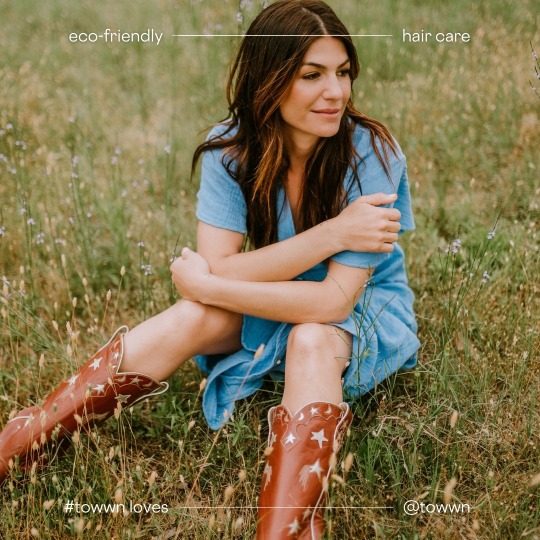
towwn: clean hair, *do care*! 💁🏼♀️
did you know hair products can have an even worse environmental impact than skincare or makeup? hair-washing consumes lots of water + energy resources, not to mention all the plastic bottles. some also harbor eco-hazardous chemicals that pollute our waterways, threaten marine life, + contribute to deforestation. luckily, healthy hair can go hand-in-hand with a planet-friendly beauty routine. let our list of fav green haircare brands guide you 💚🙋🏻♀️
@davinesofficial from dry shampoo to solid bars, every product this certified b-corp produces is made with clean energy.
@hellojupiter an eco-conscious, anti-dandruff haircare co? yup! nix chemicals & embrace plant-based ingredients (adaptogenic mushrooms 🍄) to promote healthy hair + scalp.
@mykitsch this female-founded brand extends its commitment to reducing carbon emissions, single-use plastics & excess packaging by using paper + partnering with @4ocean.
@thecalifornianaturals with skate icon tony hawk as chief culture officer, this brand brings a chill cali-vibe to showers everywhere. formulas are vegan, cruelty-free + ocean-safe with 100% recycled packaging.
@patternbeauty known for clean, safe ingredients + cruelty-free practices. we also love how pattern engages those with textured hair to champion self-acceptance + diverse beauty.
@byhumankind bar shampoos + conditioners are better for the planet because they eliminate plastics that add to pollution + landfills. they also need less water, which reduces the overall eco-footprint.
@odelebeauty odele’s haircare line is made from plant ingredients like salvia hispanica + amaranthus caudatus seed extracts, hydrolyzed quinoa, + rice protein.
@functionofbeauty offering customizable products, fob lets customers order exactly what they need to reduce waste. recyclable packaging + prioritizing clean ingredients = minimal environmental impact.
@weareuni refillable aluminum bottles, less single-use plastic + refills minimize shipping emissions, making uni's shower kit a great green choice. with clean ingredients, ethical sourcing + fair trade practices, the brand is part of @1percentftp, donating 1% of sales to eco-causes.
12 notes
·
View notes